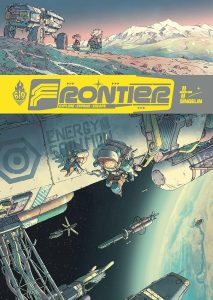 Frontier
Frontier
Cartoonist: William Singelin
Translator: Dan Christensen
Localization/Editor: Mike Kennedy
Production/Letterer: Chris Northrop
Publisher: Magnetic Press / $24.99
August 2024
Its reach spans galaxies, but there are only four characters at the heart of Frontier. The scientist who sold off control to ensure his dream ship would be built. The spacer who has never set foot on a planet. The sparrow, an ex-mercenary who lost a limb on her last job. And the monkey. He’s a monkey. A series of atmospheric collisions bring them together, let’s call it chance, and the path reveals itself. Guillaume Singelin presents readers with a question and an answer. What if we make it to the future and things are still being run into the ground for a fast return on an ill-conceived investment? Welp. Like today, there are some people who hold it all together. Here are four of them.
Singelin paints the bleak, capitalist dystopia something breathtakingly beautiful. The colors are stunning. Space in Frontier is something you can look at and still feel a sense of wonder about, get lost in, even though there’s a hired merc squad dropping out of their ship onto the far end of a small skeleton-crewed orbital station in the panel’s foreground. Not only does Frontier somehow get you to peek past the plot, there’s plot in the background too. The ghostly shadows of future importance block out the stars, for keen eyes to spy. Just as the light rays from beneath the station paint celestial fire reflecting on the ship’s windows. (My Magnetic Press paperback is not only gorgeously printed, it is ginormous in printing). An overwhelming attention to detail has been paid to the colors, near and far.
 The landscapes demand to be just as lived. Green valley cradles lab complex. Rainbow pinstripe mountain lines in the badlands against azure ore fields. Shareholders wouldn’t terraform a planet without a reason to colonize it, so every place you go has a specific (undiscussed) history of ecology and technology going back decades. Complex ideas need complex execution. Singelin’s comic is a towering achievement of imagination, built with visual details. If your specialty is zero-gravity combat security, you’re going to be geared up. Every bit of space within the ship has to be used with maximum efficiency, from how to design a housing complex to how much carbon dioxide cleaning you can get out of a greenhouse.
The landscapes demand to be just as lived. Green valley cradles lab complex. Rainbow pinstripe mountain lines in the badlands against azure ore fields. Shareholders wouldn’t terraform a planet without a reason to colonize it, so every place you go has a specific (undiscussed) history of ecology and technology going back decades. Complex ideas need complex execution. Singelin’s comic is a towering achievement of imagination, built with visual details. If your specialty is zero-gravity combat security, you’re going to be geared up. Every bit of space within the ship has to be used with maximum efficiency, from how to design a housing complex to how much carbon dioxide cleaning you can get out of a greenhouse.
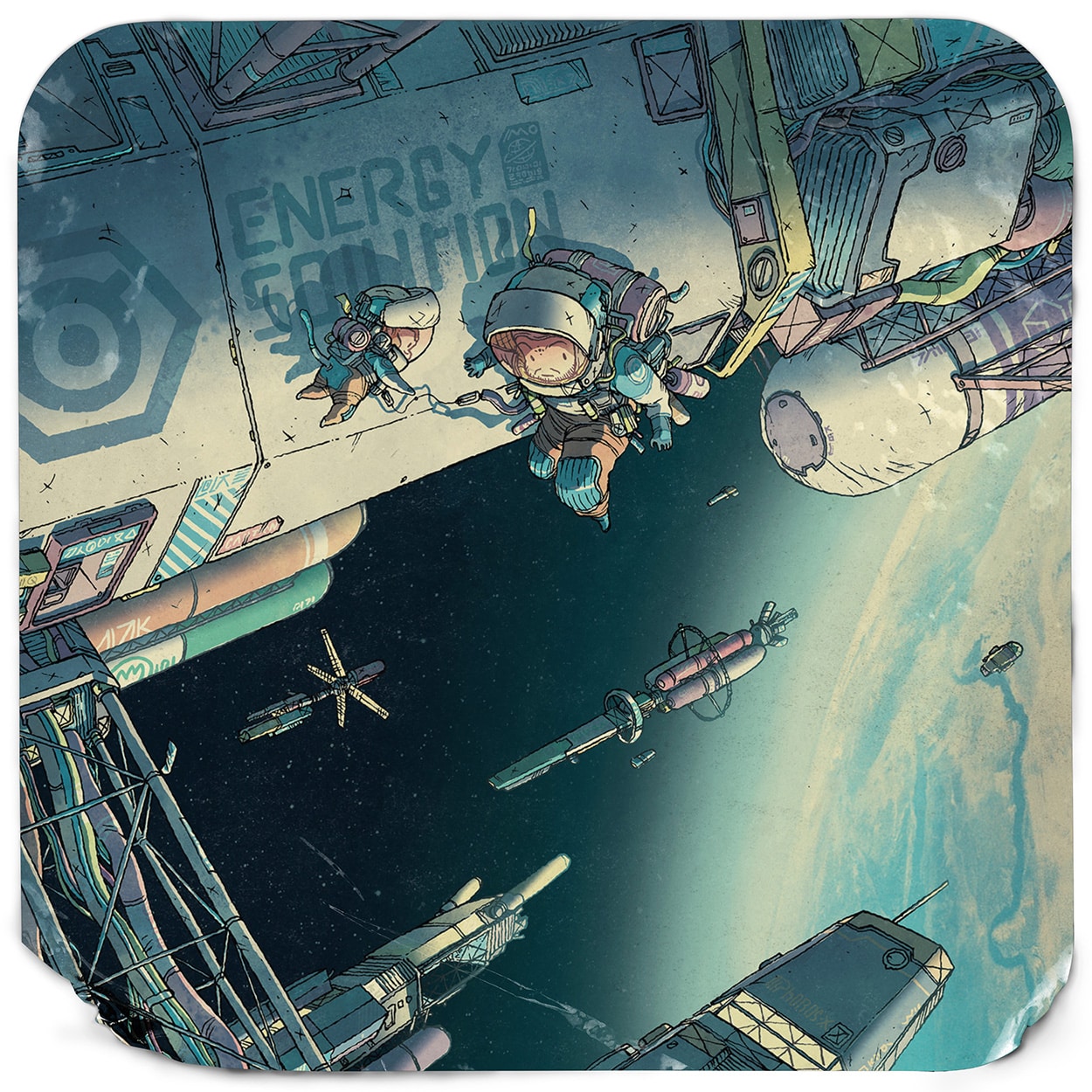
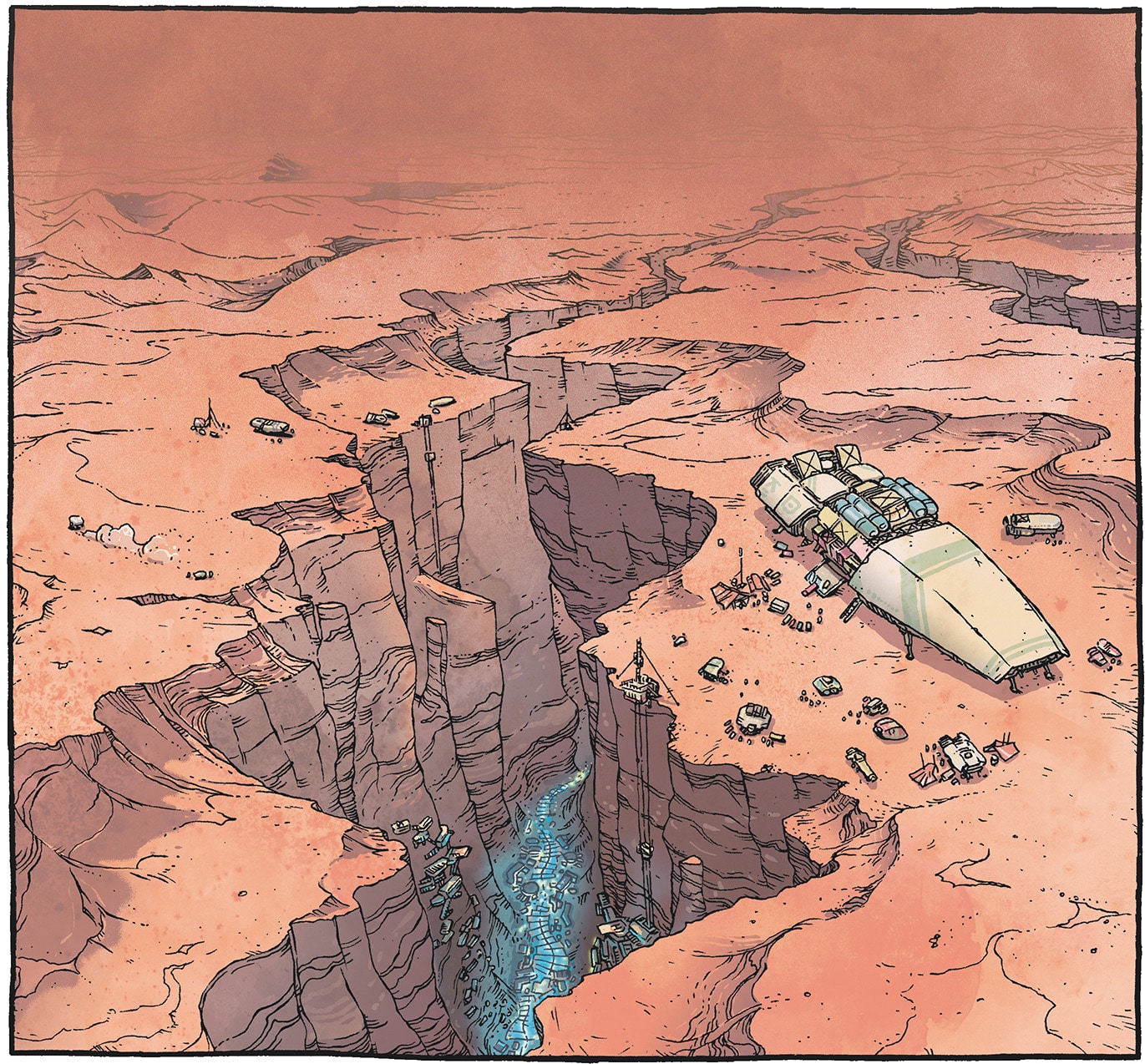 How to move a monkey around in a vacuum is a cute fix; what to drive through a wilderness without roads is a step more in the Alien or Grizzly Grobus direction, heavy utility. The same inclination for chunky-switch minutiae that imbues a personal spaceship with character informs the intersection of vehicle and setting that is Frontier‘s take on a space station. Combine late-stage-capitalism city-in-a-bottle with the intensity of the violence in this story and when things come apart, they don’t just break, they shatter completely. Singelin shows all the shrapnel.
How to move a monkey around in a vacuum is a cute fix; what to drive through a wilderness without roads is a step more in the Alien or Grizzly Grobus direction, heavy utility. The same inclination for chunky-switch minutiae that imbues a personal spaceship with character informs the intersection of vehicle and setting that is Frontier‘s take on a space station. Combine late-stage-capitalism city-in-a-bottle with the intensity of the violence in this story and when things come apart, they don’t just break, they shatter completely. Singelin shows all the shrapnel.
The monkey (named Goku of course) is exceptionally cute in all circumstances, not just in a little space pod. I guess I should have expected to be clobbered by cuteness given the therapy dog co-star of Singelin’s First Second graphic novel PTSD. And cute beyond monkeys isn’t out of place in the slightest– the aesthetic for the world might be Madhouse but the people are thoroughly Toei. Bomberman sprites in Metal Gear Solid levels. Girls’ Last Tour. Think of the many times Masamune Shirow leaned into being weird when doing Ghost in the Shell– but everyone looks bumper SD for the whole of Frontier. And though there is clutter Frontier is a book about debris- it comes off roomy as well as dense. One gets the same tone from the station and the view as the people occupying them. There are these broad strokes, like big heads or brutalist constructions, simple forms that are cemented into the book with a dearth of selective realism (Akira Toriyama territory). Negative space with cyberpunk filigree along every edge.
Be prepared to put down the politics and forget the twee art angle at the drop of a dime, the action comes without warning and explosively fast. Frontier presents you with plenty of stingingly familiar reasons to get angry, but the sense of familiarity makes it (sadly) a little shocking to see people act out and strike back instead of just accepting the intolerable. Frontier is Shirow in his ability to look silly and serious at the same time, but also in how fast and wild the action pops off. As in PTSDSingelin examines veterans and trauma, how putting the past behind you is impossible with the perennial ubiquity of violence. Conflict shows up and the peaceful warrior cannot pretend to not see. No flying jumps here, mostly guns not swords, but the severity and mastery of the combat combined with the chivalry of outlaws being pitted against corrupt authority puts me in a wuxia kind of mood.
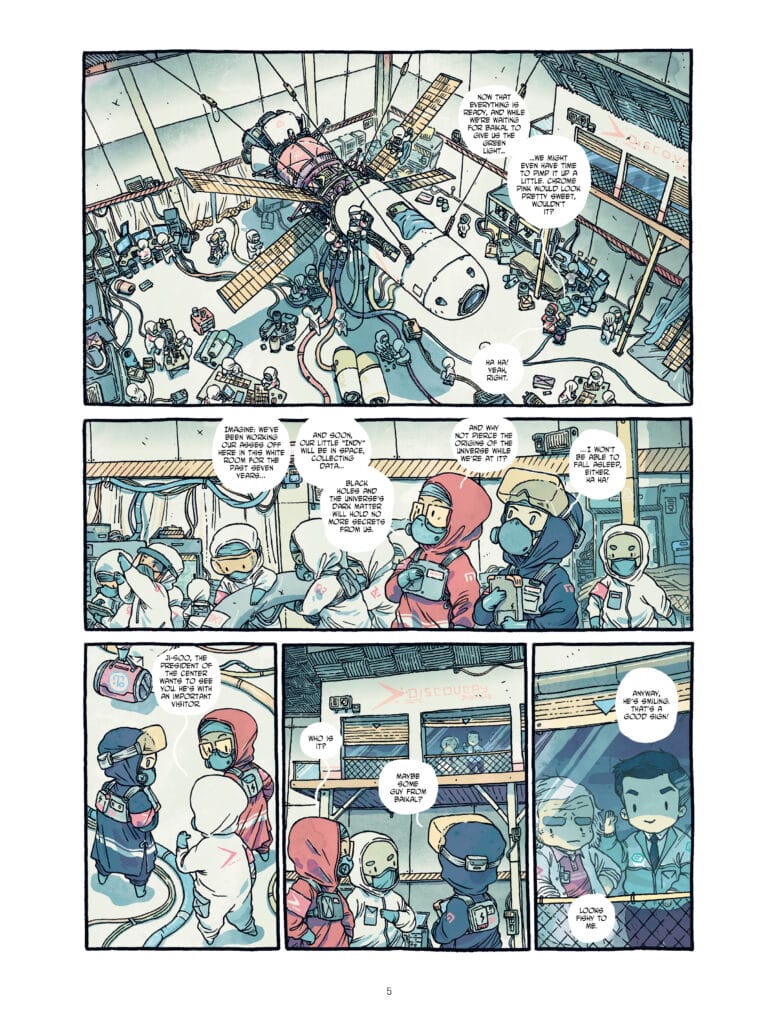
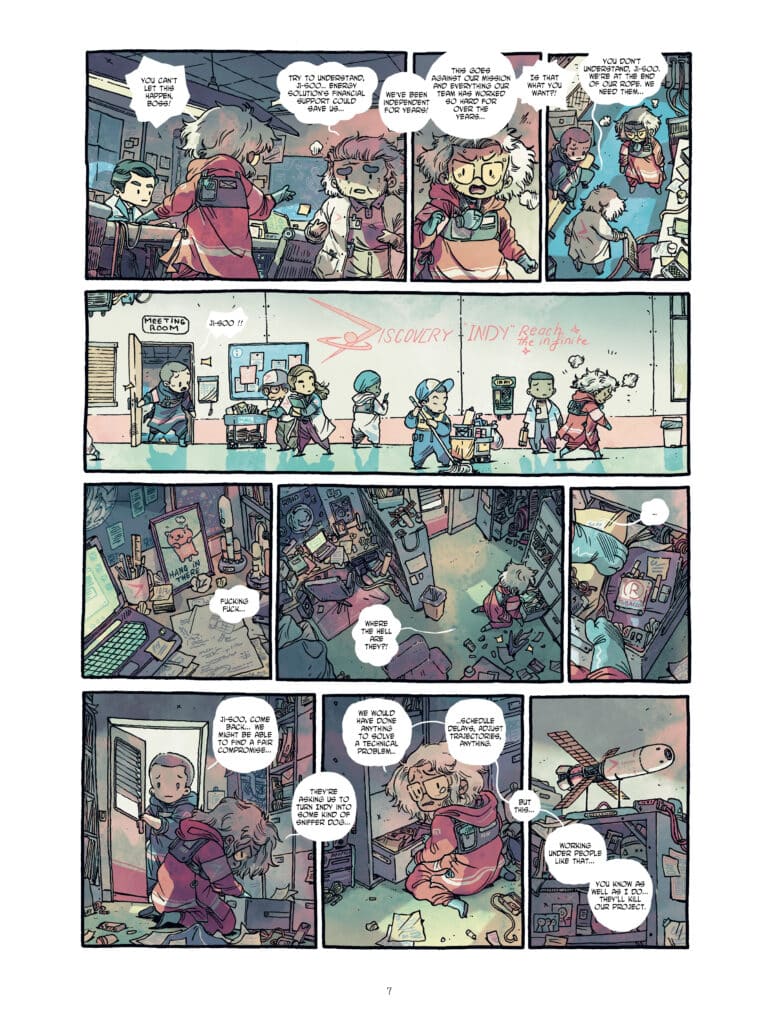 As for politics, you don’t have to guess what’s on Singelin’s mind. Frontier isn’t a metaphor for a contemporary problem masked with future circumstance- it’s future circumstance with contemporary problems. Does that make sense? A warning about the Ridley Scott future that’s already old. Today’s headaches, tomorrow. Dystopic entropy via consistent mismanagement. Singelin was the character artist for the Jump Over the Age video game Citizen Sleeper“roleplaying in the ruins of interplanetary capitalism,” and Frontier is definitely from the same page. Look: space ships built cheaply don’t stand up to pirate interception, they crumple and shred the poor people inside. When I say poor, I do mean pity their fate, but I also mean their grip on resources. You gotta be out to take a job like that, shame it had to be your last.
As for politics, you don’t have to guess what’s on Singelin’s mind. Frontier isn’t a metaphor for a contemporary problem masked with future circumstance- it’s future circumstance with contemporary problems. Does that make sense? A warning about the Ridley Scott future that’s already old. Today’s headaches, tomorrow. Dystopic entropy via consistent mismanagement. Singelin was the character artist for the Jump Over the Age video game Citizen Sleeper“roleplaying in the ruins of interplanetary capitalism,” and Frontier is definitely from the same page. Look: space ships built cheaply don’t stand up to pirate interception, they crumple and shred the poor people inside. When I say poor, I do mean pity their fate, but I also mean their grip on resources. You gotta be out to take a job like that, shame it had to be your last.
Frontier es Available from Magnetic Press or wherever finer comics and books are sold.



